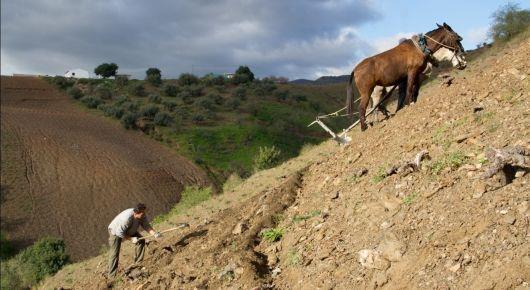Scientists study Malaga’s globally important agricultural heritage to search for climate resiliency

FAO collaborated with the University of Malaga, Spain, to analyse the resilience and vulnerability of the local traditional Mediterranean agricultural system of vineyards to climate change. The joint work with academic institutions helps to build scientific evidence for climate resilient agriculture.
The “Malaga Raisin Production System in La Axarquía” project was selected as a pioneer case study in Europe and Central Asia, receiving recognition as a Globally Important Agricultural Heritage System (GIAHS) by FAO in 2017. The area represents an example of Mediterranean agriculture that has survived for 500 years, providing food security and livelihoods to the local community.
The study revealed that the vineyard crop and the raisin grape production – central to the organization and way of life of the territory – is well-adapted to the expected circumstances of climate change. The results indicate that species deeply rooted in this climatic zone, such as a rainfed crop, were very resilient to irregular conditions and can withstand even extended periods of summer. Moreover, high temperatures did not greatly affect the raisin production.
The strong cultural identity and social organization are additional pillars of the resilient grape production system. Local entrepreneurs in Malaga are playing a fundamental role, too, through innovation and economic diversification.
However, as the study revealed, negative demographic and socio-economic trends contribute greatly to the climate change vulnerability of these systems. An ageing population prevents generational replacement and transmission of knowledge with the abandonment of agricultural activity. Furthermore, economic activity in the region relies greatly on public subsidies, tourism, and subtropical crops.
“Globally Important Agricultural Heritage Systems sites have evolved over decades, centuries, or even millennia in a sustainable way thanks to the efficient coadaptation between human beings and the environment,” said Marta Arnés, FAO GIAHS specialist. “However, global trends in food and agriculture, climate change, and competition for natural resources put these systems under pressure and threaten their existence. Which, in this case, could imply the loss of time-tested agricultural knowledge and techniques for climate adaptation.”
Vine cultivation on the steep slopes of La Axarquía helps limit soil erosion. In addition, traditional nature-based techniques called agüareas (agri-spillways) reduce runoff processes by tilling rills in the down-slope direction to canalize water and sediments. In the same way, dry-stone walls and staggered planting supporting the crops, preventing land degradation.
In contrast, tropical crops, introduced in the region in the last decade, are among the most vulnerable. These crops are in high demand due to greater profitability, and, together with tourism, these are the main sources of income in La Axarquía. However, the increased water needs makes these tropical crops very vulnerable to climate change in such a water-deficit region. In addition, overuse of water resources can reduce water availability in the soil.
Globally Important Agricultural Heritage System sites represent outstanding landscapes, rich in biodiversity, cultural values, and a community sense of place that provides local food and livelihood security. These agricultural systems are examples of high resilience and precious agroecological nature-based techniques that can help agriculture adapt to ever-changing social, environmental, and economic conditions. Therefore, GIAHS offers a landscape in which to diagnose the degree of resilience that resides in such sites, acting as living and evolving laboratories of sustainable agriculture.
The joint study, carried out in collaboration with the University of Malaga, is part of FAO’s regional initiative on managing natural resources sustainably and preserving biodiversity under a changing climate. An indicator-based methodology was used to analyse the vulnerability and resilience to climate change, supported by several components, including exposure, sensitivity, affection, and adaptive capacity.
2 April 2021, Budapest, Hungary
